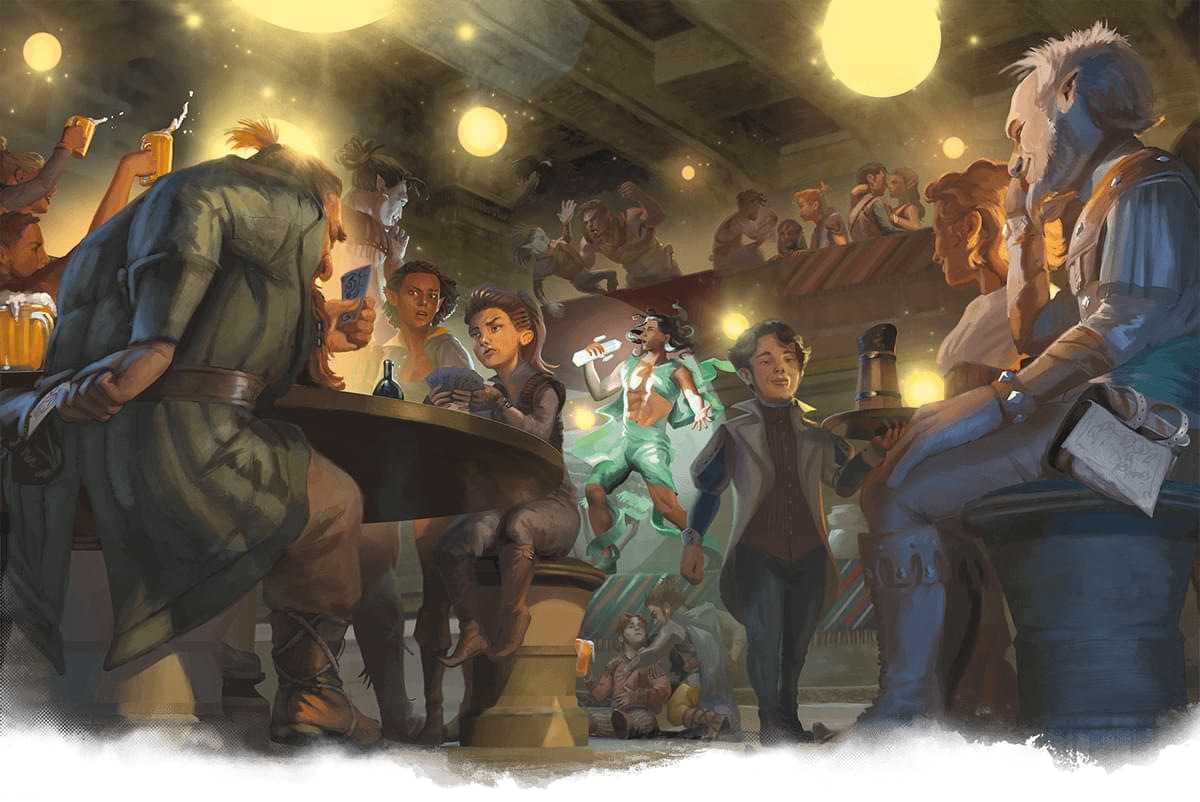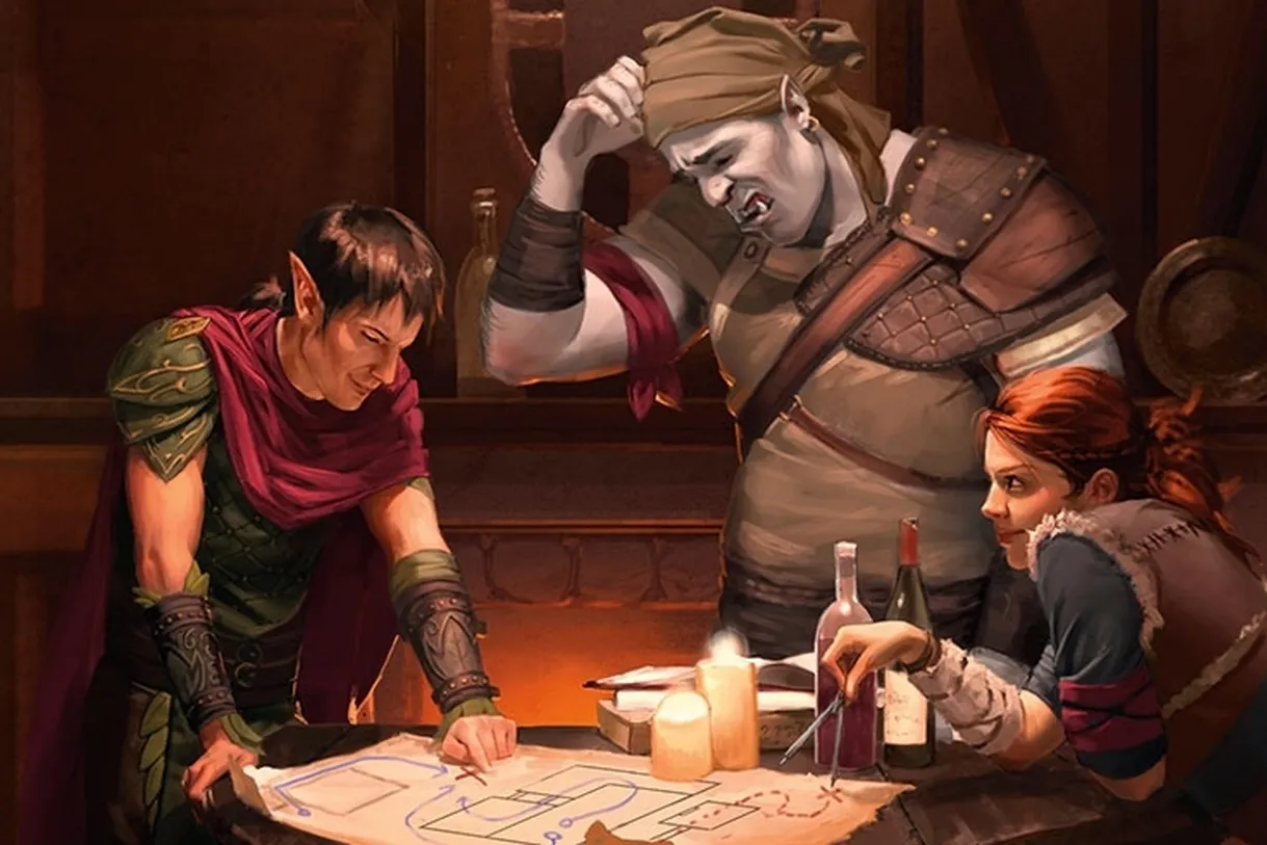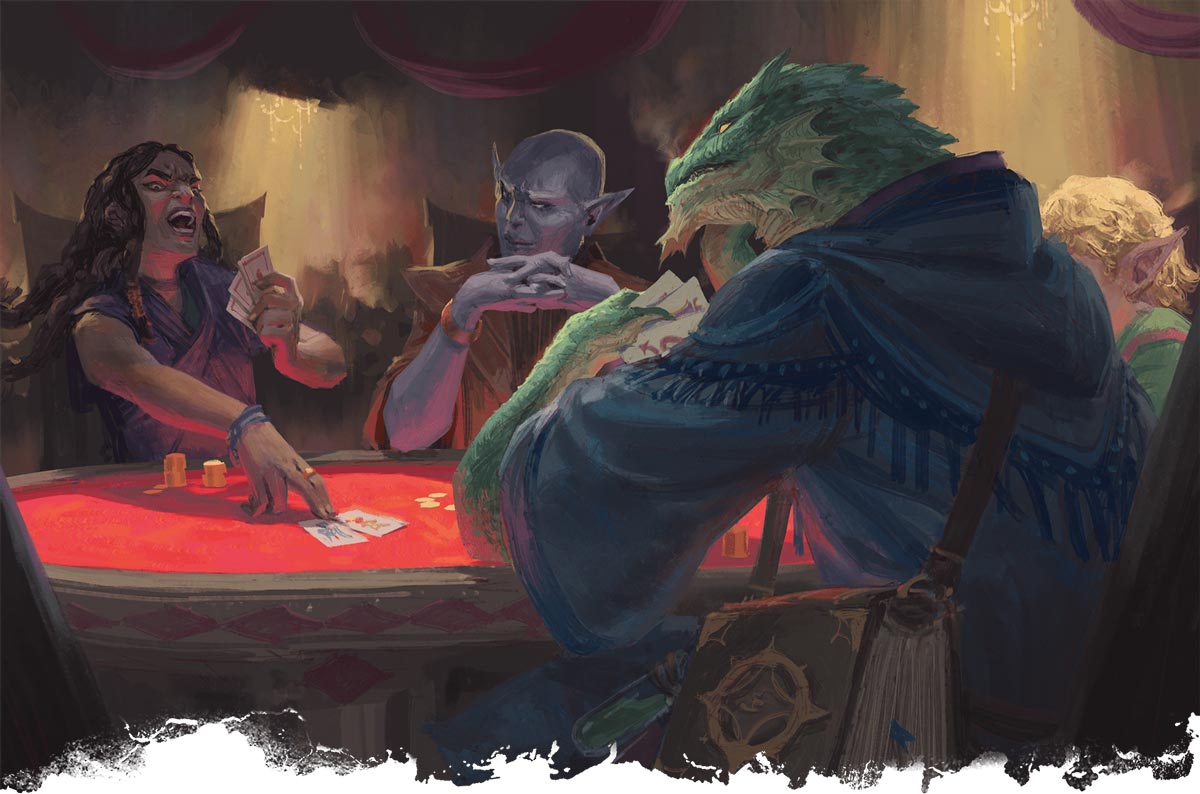Planning a heist in Dungeons & Dragons is a challenging and exciting task for players to flex their strategic thinking. Their goal cannot be accomplished by force, so they’ll need to think outside the box to succeed.
While banks, dragon lairs, and even the Underdark can make for effective environments for these adventures, casinos might just be the perfect setting for a high-stakes heist full of twists and turns. Casinos are full of valuables, usually open to the public, and brimming with security. They also provide plenty of scenarios in which a heist could take place, like a high roller card tournament or events that cater to well-to-do nobles.
In this article, we explore steps you can take to ensure your casino heist goes off without a hitch:
- Lay Out the Basics of Your Heist
- Map Your Casino
- Prepare Your D&D Casino Games
- Create Your Complications
Access the Golden Vault
If you’re looking to run a heist adventure, Keys from the Golden Vault contains 13 heist-centric missions that range from levels 1-11. These missions can be run as a standalone adventure, slotted into your current campaign, or strung together for an episodic campaign of non-stop heist action!
1. Lay Out the Basics of Your Heist

Few environments will be as fun to plan as a fantasy casino. But, with so many interesting aspects to lay out, where will you start? Here are some questions you should ask yourself when coming up with the idea for your gambling joint:
- What level are your players? Low-level parties can be challenged by mundane guards and traps, whereas high-level players will need more intricate security measures, such as deadly beasts, antimagic fields, and ways to detect illusion magic.
- Who are the casino’s intended patrons? Maybe your casino is an underground gambling den in a major city that caters to criminals. Or perhaps it’s a luxury retreat on a tropical island that can only be accessed by boat.
- What are they stealing? Beyond piles of gold, casinos can contain a variety of valuable items. Maybe a rare gemstone is on display that has unknown magical properties. Or perhaps the casino owner has traded an indebted gambler for a journal containing sensitive information that the party needs to steal.
- What are the security measures? Based on the level of the characters and the type of casino they’ll be breaking into, you’ll be able to come up with the appropriate security measures they’ll need to bypass to achieve their goal. Most casinos will have security personnel stationed on the floor, but what magical and mundane security features protect the casino’s wealth?
- Who are the people of interest? There will likely be NPCs that will help or hinder your party’s plans for robbing the casino. Maybe they’ve been hired by a benefactor that wants them to retrieve an object from the casino’s vault but doesn’t tell them the full extent of the item’s properties. On the other hand, what of the casino’s owner? Are they a paranoid wizard that uses divination magic to ensure nobody’s cheating? Or are they a sociable noble with a dark secret?
- What are the player’s routes to their goal? Heists allow players to analyze an environment and devise their own plans. When creating your casino, think of multiple ways players can get where they need to go. Maybe the casino has tunnels for sewage beneath the floor or air vents that can fit a Small creature. Or perhaps employees have a separate entrance and access to restricted areas. Allude to these points when players gather information but don’t make them too blatant. You want the players to be the masterminds behind their heist.
2. Map Your Casino

Some groups like battlemaps, while others prefer theater of the mind. For heist adventures, having a map that players can use to plan their heist is crucial for helping them make meaningful choices about their upcoming mission.
That said, the player version of the map shouldn’t contain all of the casino’s secrets. It doesn’t even need to be 100% accurate. Depending on the source the characters got the intel from, some information could be out of date or faulty, which helps make interesting twists when the players realize they’ll have to change their plan on the fly.
A DM-specific map will also be a useful guide when you need to quickly reference a location’s features during play. In heist adventures, DMs will have plenty of things they need to keep in mind. Your DM map could contain things not visible on the player map, like:
- Which doors are locked
- Where traps are located
- Where alarm spells have been cast
- What routes patrols take
- Secret passageways
If you’re not planning on using these maps as a battlemap, don’t worry about getting bogged down in details like exact distances. A quick sketch with icons and notations will certainly suffice.
3. Prepare Your D&D Casino Games

You can’t run a casino heist without giving your players the opportunity to gamble away their gold. Here are some quick and fun games you can play that will help immerse your players in the casino setting:
Three-Dragon Ante
Making an appearance in several books such as Waterdeep: Dragon Heist, Baldur’s Gate: Descent Into Avernus, and Tomb of Annihilation, Three-Dragon Ante is one of the most popular card games in the Forgotten Realms.
While you can purchase a real Three-Dragon Ante card set, The Stygian Gambit adventure in Keys from the Golden Vault contains rules for running the game with dice, as well as other games of chance you can include in your casino:
Step 1. Randomly determine which participant is the dealer.
Step 2. Each participant (including the dealer) places their opening bet, then rolls five d12s to determine their hand, keeping these die rolls hidden from the other participants.
Step 3. Starting to the left of the dealer and continuing clockwise, each participant reveals one of their die rolls. This step is repeated twice more; on the second and third round, each participant can raise their bet before revealing their next die roll. The other participants each have three options: match the bet, raise their bet (in which case all participants must match that bet in turn), or fold, forfeiting any bet they’ve placed and dropping out of the game.
Step 4. Each participant who hasn’t folded totals their die rolls. The one with the highest total wins. The winner becomes the dealer for the next game (assuming the participant wants to keep playing).
Skill Checks
If you want to simulate a game without spending the time necessary to play through the whole game, you can have players make skill checks against their opponents to see who wins. This could be as simple as rolling a contested d20 for games of chance against the house.
If you’re looking for something more complex, say for a Casino Royale-esque game of high-stakes Texas hold ‘em, consider running a skill challenge. Characters may have to succeed in Charisma (Deception) checks to bluff, Dexterity (Sleight of Hand) checks to cheat, Intelligence (Investigation) checks to count cards, or Wisdom (Insight) checks to determine if their opponents are bluffing. After a certain amount of successes or failures, the game's outcome can be determined.
4. Create Your Complications
What would a heist adventure be without unexpected twists? These moments when the plan goes wrong or hasn't taken something into account are thrilling and provoke quick thinking rarely seen in other pillars of D&D gameplay. While complications aren't the only way to add tension to a heist, these unexpected twists can snap your players to attention right when they thought everything was cruising along:
- What will the employees do if they notice suspicious activity? Guests are usually under careful scrutiny at casinos. What happens if a player is caught cheating or going somewhere they shouldn't? Prisoner 13, an adventure from Keys from the Golden Vault that you can claim at no cost, has an excellent Suspicion mechanic that increases patrols and the DCs for checks based on how alert the security is.
- Are there other crews competing for the same prize? Maybe the party has encountered a rival crew in the past and they notice one of the crew members playing cards. Now it's a race against their rivals to see who can get the score first.
- What if the party needs help? Maybe the casino has magical defenses beyond the party's means to disable. They may need to bring in an artificer to build a device for them and cut them into the reward. And wouldn't it be a shame if the artificer double-crossed them at the worst possible moment?
- What if their planned escape route doesn't work? How will the party react when they finally get into the vault, but the MacGuffin is too big to be stowed away safely and carried out the front door? Perhaps breaking into the vault has caused the casino to go on lockdown. Hope the party has planned an alternate exit strategy.
- What if something goes wrong? Heists usually involve splitting the party to some degree. How will your separated party members signal that things have gone wrong? Maybe there’s a pre-agreed upon meeting place and time or code word for when a party member has gotten themselves into trouble? (May I suggest “Jenga” as the code word?)
Are You Feeling Lucky?
With your casino ready to go, it’s time to get your crew together and start planning the heist! Be careful, though. You may need more than good luck to execute your plan in this high-security environment. If you’re looking for heist adventures that take the prep work off your hands, check out Keys from the Golden Vault for 13 exhilarating heists that will take your players to museums, casinos, thieves’ guilds, and more!
Mike Bernier (@arcane_eye) is the founder of Arcane Eye, a site focused on providing useful tips and tricks to all those involved in the world of D&D. Outside of writing for Arcane Eye, Mike spends most of his time playing games, hiking with his girlfriend, and tending the veritable jungle of houseplants that have invaded his house.








-
View User Profile
-
Send Message
Posted Feb 16, 2023Cool article!
-
View User Profile
-
Send Message
Posted Feb 16, 2023Nice article, it really made me start to think of the in between zone for theater of the mind and battle maps where there are no or few defined distances only rougher sketches which I had not thought of before, I'll have to use that.
One little thing though, On the skill checks for three-dragon ante I rolled well on perception and realized insight is wisdom not intelligence.
-
View User Profile
-
Send Message
Posted Feb 16, 2023Looks like someone picked up the Observant feat! I corrected the mistake :)
-
View User Profile
-
Send Message
Posted Feb 16, 2023Are there cracks under doors, etc.? Is anything lined with lead to prevent teleportation, scrying, etc.? Are any employees vulnerable psychically to manipulation / charm / magic jar? Are there any measures against invisible people or creatures? What if a druid has wild shaped into a housefly or ant or flea? Can you use a portable hole? How do you get the loot out without it being seen on your person? Are you having to carry a ton of coins? Where do you fence loot? Are there any measures against polymorphed or shapeshifted creatures, or Disguise Self, etc.? How are employees screened? Are guards rotated out? etc.
-
View User Profile
-
Send Message
Posted Feb 16, 2023Sure wish I knew someone that played Three Dragon Ante, aside from myself. I have all the editions and even the recent Giants War expansion.
Beats Magic ;)
-
View User Profile
-
Send Message
Posted Feb 16, 2023ok give us something new as the front page of dnd beyond
-
View User Profile
-
Send Message
Posted Feb 18, 2023Liam O'Brien has entered the chat
-
View User Profile
-
Send Message
Posted Feb 18, 2023The only thing I would critique, which is more of a critique in general when designers create rules to play out games, is that there isn’t consideration to what benefit a PC has if they are proficient in the game in question. If a player invested in making their PC proficient in three dragon ante from a mechanics perspective and has no mechanical difference in how the game is played than others, it devalues the choice.
A couple of suggestions to this might be that the player proficient with three-dragon ante can roll 6 d12s and pick the 5 dice to make up the hand when playing the game out; when simulating with skill checks is the easiest to incorporate mechanically to include proficiency in the game.
-
View User Profile
-
Send Message
Posted Feb 19, 2023There are some wonderful heist examples in various TV shows I've seen. Not that I remember the name of the series or the episode, but they did stand out in my memory. One or two of them have featured casinos. And of course James Bond seems to have to get something out of a casino in every other movie.
-
View User Profile
-
Send Message
Posted Feb 20, 2023Nice!
-
View User Profile
-
Send Message
Posted Feb 23, 2023Excellent ideas.
-
View User Profile
-
Send Message
Posted Feb 25, 2023While on paper I like that addition, I feel it doesn't add to the narrative to say "you played this game a lot and know the ins and outs, so you get a better hit from the deck" since being good at poker in no way means your starting hand is any better or worse.
Instead, I imagine most savvy players will use their skills as described in the Skill Challenge section when playing out 3DA--such as trying to tell if a competitor is bluffing when they put down a low roll on the third round, counting cards, shuffling with sleight of hand etc. THAT'S where i'd put the proficiency for the game itself; maybe even getting the bonus twice a la expertise if they already have proficiency in a skill like insight or investigation, plus at the game itself!
-
View User Profile
-
Send Message
Posted Feb 28, 2023Awesom stuff. Not much for heists but will try it at least. Is... Is THAT a Green Chromatic Dragonborn from Fizban ToD? Great looking!
( Psst! I would love to get.. buy some Nolzur pre and unpainted Fizban Dragonborns of distinct Chromatic, Gemstone and Metallic types, and the Gem ones should come as clear plastic, for unpainted, use gloss varnish BEFORE applying basecoat on clear/ transclucent minis and parts ; )
-
View User Profile
-
Send Message
Posted Mar 2, 2023koq